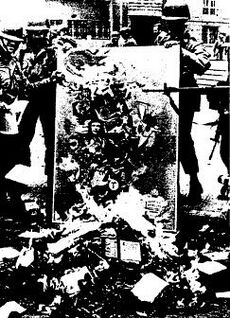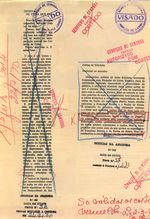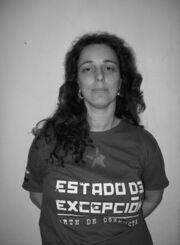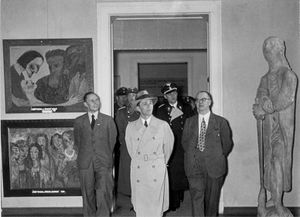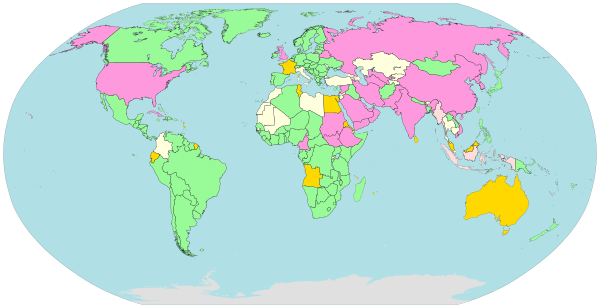رقابة
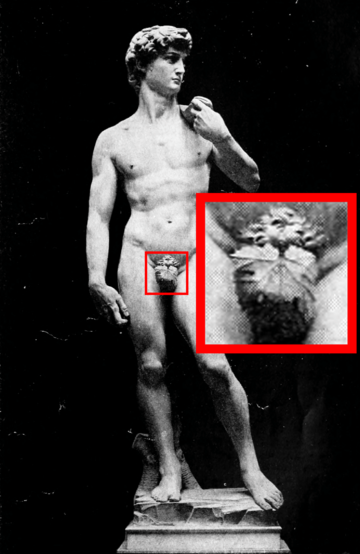
| علم المعلومات |
|---|
| سمات عامّة |
| المجالات والفروع ذات الصلة |
| بوابة |
الرقابة التحكم فيما يسمح للأشخاص بقوله أو سماعه، أو كتابته، أو قراءته، أو رؤيته أو فعله. ويأتي مثل هذا النمط من التحكم عادة من الحكومة، أو من أشكال متنوعة من الجماعات الخاصة. ويمكن للرقابة أن تؤثر على حرية الكتب والصحف والمجلات والأفلام وبرامج الإذاعة والتلفاز وعلى مايلقى من خطب. كما يمكن أن يمتد تأثيرها أيضاً إلى الموسيقى والرسم والنحت وغيرها من الفنون.
ويبدو أن كل المجتمعات بما فيها المجتمعات الديمقراطية قد استخدمت نوعاً من أنواع الرقابة متى ما شعر حكامها بفائدة الرقابة على شعوبهم أو على أنفسهم. غير أن المغالاة في تشديد الرقابة على حرية التعبير والإعلام تتجلى في ظل الحكم الاستبدادي وفي زمن الحروب.
التاريخ
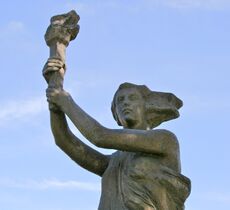
In 399 BC, Greek philosopher, Socrates, while defying attempts by the Athenian state to censor his philosophical teachings, was accused of collateral charges related to the corruption of Athenian youth and sentenced to death by drinking a poison, hemlock.
The details of Socrates's conviction are recorded by Plato as follows. In 399 BC, Socrates went on trial[3] and was subsequently found guilty of both corrupting the minds of the youth of Athens and of impiety (asebeia,[4] "not believing in the gods of the state"),[5] and as a punishment sentenced to death, caused by the drinking of a mixture containing hemlock.[6][7][8]
Socrates' student, Plato, is said to have advocated censorship in his essay on The Republic, which opposed the existence of democracy. In contrast to Plato, Greek playwright Euripides (480–406 BC) defended the true liberty of freeborn men, including the right to speak freely. In 1766, Sweden became the first country to abolish censorship by law.[9]
الأساس المنطقي والنقد
Censorship has been criticized throughout history for being unfair and hindering progress. In a 1997 essay on Internet censorship, social commentator Michael Landier explains that censorship is counterproductive as it prevents the censored topic from being discussed. Landier expands his argument by claiming that those who impose censorship must consider what they censor to be true, as individuals believing themselves to be correct would welcome the opportunity to disprove those with opposing views.[10]
Censorship is often used to impose moral values on society, as in the censorship of material considered obscene. English novelist E. M. Forster was a staunch opponent of censoring material on the grounds that it was obscene or immoral, raising the issue of moral subjectivity and the constant changing of moral values. When the 1928 novel Lady Chatterley's Lover was put on trial in 1960, Forster wrote:[11]
Lady Chatterley's Lover is a literary work of importance...I do not think that it could be held obscene, but am in a difficulty here, for the reason that I have never been able to follow the legal definition of obscenity. The law tells me that obscenity may deprave and corrupt, but as far as I know, it offers no definition of depravity or corruption.
Proponents have sought to justify it using different rationales for various types of information censored:
- Moral censorship is the removal of materials that are obscene or otherwise considered morally questionable. Pornography, for example, is often censored under this rationale, especially child pornography, which is illegal and censored in most jurisdictions in the world.[12][13]
- Military censorship is the process of keeping military intelligence and tactics confidential and away from the enemy. This is used to counter espionage.
- Political censorship occurs when governments hold back information from their citizens. This is often done to exert control over the populace and prevent free expression that might foment rebellion.
- Religious censorship is the means by which any material considered objectionable by a certain religion is removed. This often involves a dominant religion forcing limitations on less prevalent ones. Alternatively, one religion may shun the works of another when they believe the content is not appropriate for their religion.
- Corporate censorship is the process by which editors in corporate media outlets intervene to disrupt the publishing of information that portrays their business or business partners in a negative light,[14][15] or intervene to prevent alternate offers from reaching public exposure.[16]
الأنواع
هناك أربعة أنماط رئيسية للرقابة: 1ـ أخلاقية، 2ـ عسكرية، 3ـ سياسية، 4ـ دينية.
الرقابة الأخلاقية
أكثر أنواع الرقابة شيوعًا في الوقت الحاضر. إذ تحاول العديد من الحكومات، أو الجماعات أن تحافظ على القيم الأخلاقية وذلك بالحيلولة دون إطلاع الناس على قيم أخرى أو اتِّباعها. وقد تنجم الرقابة الأخلاقية عن اعتقاد بعض الناس بامتلاكهم الحق في فرض قيمهم على الآخرين. كما يمكن أن تبرز إذا ما اعتقدت الغالبية العظمى في دولة ما، أن على الحكومة تعزيز بعض المبادئ الأخلاقية. وتمتلك دول عديدة قوانين تتعلق بالآداب العامة وما ينافيها من أعمال.
الرقابة العسكرية
في زمن الحروب، يمكن لخطط المعارك، وبرامج تحرك القوات والمعطيات المتعلقة بالأسلحة وغيرها من المعلومات أن تساعد العدو. ولهذا تمتلك القوات المسلحة في كل بلد عدداً من المراقبين ممن يقومون بقراءة الرسائل التي يرسلها أو يتلقاها العاملون في الخدمة العسكرية. ويحذف المراقب أو يطمس أية معلومات يمكن أن يستفيد منها العدو. كما يمكن للسلطات العسكرية أن تحجب معلومات عن الصحافة لأسباب أمنية. وتقوم أجهزة الإعلام في بعض الدول، كالصحافة والإذاعة والتلفاز بممارسة رقابة طوعية على نفسها وقت الحروب، كما تمارس معظم الدول نوعاً من الرقابة العسكرية في زمن السلم أيضًا.
الرقابة السياسية
تمارسها الحكومات حيث تمنع أنواع التعبير التي لا تصادق عليها الدولة. على سبيل المثال، مارست حكومة المملكة المتحدة الرقابة السياسية أثناء الحرب العالمية الثانية. ومثال ذلك الاتحاد السوڤيتي (سابقًا) ورقابته السياسية.
لا تسمح الديمقراطيات بالرقابة السياسية بشكل رسمي، إلا أن العديد من الحكومات الديمقراطية تحاول عدم تشجيع التعبير عن بعض الأفكار الراديكالية المتطرفة. مثال ذلك القوانين المختلفة التي تمنع الخطب أو الكتابات التي يمكن لها أن تثير العنف والشغب. وتمارس العديد من الحكومات الديمقراطية الرقابة السياسية، لاعتقادها أن انتقاد الحكومة ومعارضة الحرب تخدم العدو.
قبل قيام الثورة البلشفية تدخل زعيم الثورة ڤلاديمير لنين في رواية الأم للكاتب الروسي السوڤيتي مكسيم گوركي، أو بصيغة أخف، نصحه بتغيير نهايتها، بينما قامت المخابرات الأمريكية بإجراء تعديلات علي رواية 1984 لجورج اورويل، هذان مثالان فقط لأمور كثيرة حدثت وتحدث وستحدث، وإذا كانت رواية اورويل فسرت بأنها موجهة ضد الشمولية والديكتاتورية في الاتحاد السوفيتي آنذاك, فهي تنسحب الآن علي الوضع الدولي للولايات المتحدة نفسها علي الرغم من الجهود الخارقة للمخابرات الامريكية في توجيه الرواية ضد الاتحاد السوڤيتي السابق، أما رواية الأم لجوركي فهي ما تزال تحافظ علي ألقها رغم التعديلات التي أجريت بمبادرة من قائد الثورة.
الرقابة الدينية
تبرز في بعض الدول حيث تُؤْثر الدولة نِحلة، أو اتجاهًا معينًا، أو حيث يكون الشعور العام الديني عارمًا. عندها قد يقوم من يمسك بزمام السلطة بفرض الرقابة على أفكار وممارسات النِّحل الأخرى. فأسبانيا مثلاً، التي ينتمي معظم سكانها إلى الكنيسة الكاثوليكية، منعت عبر تاريخها الطويل المسلمين والنّصارى البروتستانت من ممارسة شعائرهم الدينية علنًا. إلا أن الحكومة الأسبانية رفعت هذا الحظر عام 1967م.
أساليب الرقابة
هناك نوعان رئيسيان من أساليب الرقابة: رسمي وغير رسمي. تفرض الرقابة الرسمية عندما يُطبق المسؤولون الحكوميون القانون بقصد التحكم في حرية التعبير. أما الرقابة غير الرسمية، فتبرز في حال غياب قانون محدد يعالج جُرمًا ما. وقد يتصرف المسؤولون بشكل غير رسمي نتيجة ضغط جماعة خاصة عليهم، بهدف منع أمر ما لاتحبذه هذه الجماعة. كذلك قد تمارس بعض الجماعات أيضًا الضغط على الشركات المختلفة، وذلك بتهديدها لها بمقاطعة بضائعها. وهناك عدد من الجهات، بما فيها صناعة الأفلام السينمائية والتلفازية التي تفرض الرقابة الذاتية على نفسها رغبة في تجنب السخط العام، غير أن المعايير قد تردّت في الغرب منذ الخمسينيات من القرن العشرين.
وتُفرض الرقابة قبل أو بعد طرح شيء ما للجمهور. ولدى التدقيق في المادة المعروضة قبل طرحها، يمكن للمسؤولين الموافقة عليها أو رفضها، أو قبولها مع بعض التعديل. ويمكن للمراقبين أيضاً أن يتخذوا موقفًا مخالفًا من كتاب ما، أو مجلة، أو فيلم بعد طرحه في السوق. ويمكن لمراكز خدمة البريد أن ترفض إيصال بريد غير مرغوب فيه، كما يمكن لمصلحة الجمارك أن تمنع استيراد بعض المواد.
حسب وسيلة التواصل
الكتب
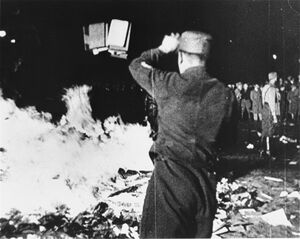
Book censorship can be enacted at the national or sub-national level, and can carry legal penalties for their infraction. Books may also be challenged at a local, community level. As a result, books can be removed from schools or libraries, although these bans do not typically extend outside of that area.
الأفلام
Aside from the usual justifications of pornography and obscenity, some films are censored due to changing racial attitudes or political correctness in order to avoid ethnic stereotyping and/or ethnic offense despite its historical or artistic value. One example is the still withdrawn "Censored Eleven" series of animated cartoons, which may have been innocent then, but are "incorrect" now.[17]
Film censorship is carried out by various countries. Film censorship is achieved by censoring the producer or restricting a state citizen. For example, in China the film industry censors LGBT-related films. Filmmakers must resort to finding funds from international investors such as the "Ford Foundations" and or produce through an independent film company.[18]
الموسيقى
Music censorship has been implemented by states, religions, educational systems, families, retailers and lobbying groups – and in most cases they violate international conventions of human rights.[19]
الخرائط
Censorship of maps is often employed for military purposes. For example, the technique was used in former East Germany, especially for the areas near the border to West Germany in order to make attempts of defection more difficult. Censorship of maps is also applied by Google Maps, where certain areas are grayed out or blacked or areas are purposely left outdated with old imagery.[20]
الفن
Art is loved and feared because of its evocative power. Destroying or oppressing art can potentially justify its meaning even more.[21]
British photographer and visual artist Graham Ovenden's photos and paintings were ordered to be destroyed by a London's magistrate court in 2015 for being "indecent"[22] and their copies had been removed from the online Tate gallery.[23]
A 1980 Israeli law forbade banned artwork composed of the four colours of the علم فلسطين،[24] and Palestinians were arrested for displaying such artwork or even for carrying sliced melons with the same pattern.[25][26][27]
Moath al-Alwi is a Guantanamo Bay prisoner who creates model ships as an expression of art. Alwi does so with the few tools he has at his disposal such as dental floss and shampoo bottles, and he is also allowed to use a small pair of scissors with rounded edges.[28] A few of Alwi's pieces are on display at John Jay College of Criminal Justice in New York. There are also other artworks on display at the College that were created by other inmates. The artwork that is being displayed might be the only way for some of the inmates to communicate with the outside. Recently things have changed though. The military has come up with a new policy that will not allow the artwork at Guantanamo Bay Military Prison to leave the prison. The artwork created by Alwi and other prisoners is now government property and can be destroyed or disposed of in whatever way the government choose, making it no longer the artist's property.[29]
Around 300 artists in Cuba are fighting for their artistic freedom due to new censorship rules Cuba's government has in place for artists. In December 2018, following the introduction of new rules that would ban music performances and artwork not authorized by the state, performance artist Tania Bruguera was detained upon arriving to Havana and released after four days.[30]
An example of extreme state censorship was the Nazis' requirements of using art as propaganda. Art was only allowed to be used as a political instrument to control people and failure to act in accordance with the censors was punishable by law, even fatal. The Degenerate Art Exhibition was a historical instance of this, the goal of which was to advertise Nazi values and slander others.[31]
الإنترنت
Internet censorship is control or suppression of the publishing or accessing of information on the Internet. It may be carried out by governments or by private organizations either at the behest of the government or on their own initiative. Individuals and organizations may engage in self-censorship on their own or due to intimidation and fear.
The issues associated with Internet censorship are similar to those for offline censorship of more traditional media. One difference is that national borders are more permeable online: residents of a country that bans certain information can find it on websites hosted outside the country. Thus censors must work to prevent access to information even though they lack physical or legal control over the websites themselves. This in turn requires the use of technical censorship methods that are unique to the Internet, such as site blocking and content filtering.[37]
Furthermore, the Domain Name System (DNS) a critical component of the Internet is dominated by centralized and few entities. The most widely used DNS root is administered by the Internet Corporation for Assigned Names and Numbers (ICANN).[38][39] As an administrator they have rights to shut down and seize domain names when they deem necessary to do so and at most times the direction is from governments. This has been the case with Wikileaks shutdowns[40] and name seizure events such as the ones executed by the National Intellectual Property Rights Coordination Center (IPR Center) managed by the Homeland Security Investigations (HSI).[41] This makes it easy for internet censorship by authorities as they have control over what should or should not be on the Internet. Some activists and researchers have started opting for alternative DNS roots, though the Internet Architecture Board[42] (IAB) does not support these DNS root providers.
Unless the censor has total control over all Internet-connected computers, such as in North Korea or Cuba, total censorship of information is very difficult or impossible to achieve due to the underlying distributed technology of the Internet. Pseudonymity and data havens (such as Freenet) protect free speech using technologies that guarantee material cannot be removed and prevents the identification of authors. Technologically savvy users can often find ways to access blocked content. Nevertheless, blocking remains an effective means of limiting access to sensitive information for most users when censors, such as those in China, are able to devote significant resources to building and maintaining a comprehensive censorship system.[37]
Views about the feasibility and effectiveness of Internet censorship have evolved in parallel with the development of the Internet and censorship technologies:
- A 1993 Time magazine article quotes computer scientist John Gillmore, one of the founders of the Electronic Frontier Foundation, as saying "The Net interprets censorship as damage and routes around it."[43]
- In November 2007, "Father of the Internet" Vint Cerf stated that he sees government control of the Internet failing because the Web is almost entirely privately owned.[44]
- A report of research conducted in 2007 and published in 2009 by the Beckman Center for Internet & Society at Harvard University stated that: "We are confident that the [censorship circumvention] tool developers will for the most part keep ahead of the governments' blocking efforts", but also that "...we believe that less than two percent of all filtered Internet users use circumvention tools".[45]
- In contrast, a 2011 report by researchers at the Oxford Internet Institute published by UNESCO concludes "... the control of information on the Internet and Web is certainly feasible, and technological advances do not therefore guarantee greater freedom of speech."[37]
A BBC World Service poll of 27,973 adults in 26 countries, including 14,306 Internet users,[46] was conducted between 30 November 2009 and 7 February 2010. The head of the polling organization felt, overall, that the poll showed that:
- Despite worries about privacy and fraud, people around the world see access to the internet as their fundamental right. They think the web is a force for good, and most don't want governments to regulate it.[47]
The poll found that nearly four in five (78%) Internet users felt that the Internet had brought them greater freedom, that most Internet users (53%) felt that "the internet should never be regulated by any level of government anywhere", and almost four in five Internet users and non-users around the world felt that access to the Internet was a fundamental right (50% strongly agreed, 29% somewhat agreed, 9% somewhat disagreed, 6% strongly disagreed, and 6% gave no opinion).[48]
وسائل التواصل
The rising use of social media in many nations has led to the emergence of citizens organizing protests through social media, sometimes called "Twitter Revolutions". The most notable of these social media-led protests were the Arab Spring uprisings, starting in 2010. In response to the use of social media in these protests, the Tunisian government began a hack of Tunisian citizens' Facebook accounts, and reports arose of accounts being deleted.[49]
Automated systems can be used to censor social media posts, and therefore limit what citizens can say online. This most notably occurs in China, where social media posts are automatically censored depending on content. In 2013, Harvard political science professor Gary King led a study to determine what caused social media posts to be censored and found that posts mentioning the government were not more or less likely to be deleted if they were supportive or critical of the government. Posts mentioning collective action were more likely to be deleted than those that had not mentioned collective action.[50] Currently, social media censorship appears primarily as a way to restrict Internet users' ability to organize protests. For the Chinese government, seeing citizens unhappy with local governance is beneficial as state and national leaders can replace unpopular officials. King and his researchers were able to predict when certain officials would be removed based on the number of unfavorable social media posts.[51]
Research has proved that criticism is tolerable on social media sites, therefore it is not censored unless it has a higher chance of collective action. It is not important whether the criticism is supportive or unsupportive of the states' leaders, the main priority of censoring certain social media posts is to make sure that no big actions are being made due to something that was said on the internet. Posts that challenge the Party's political leading role in the Chinese government are more likely to be censored due to the challenges it poses to the Chinese Communist Party.[52]
In December 2022 Elon Musk, owner and CEO of Twitter released internal documents from the social media microblogging site to journalists Matt Taibbi, Michael Shellenberger and Bari Weiss. The analysis of these files on Twitter, collectively called, the Twitter Files, explored the content moderation and visibility filtering carried out in collaboration with the Federal Bureau of Investigation on the Hunter Biden laptop controversy.
On the platform TikTok, certain hashtags have been categorized by the platform's code and determines how viewers can or cannot interact with the content or hashtag specifically. Some shadowbanned tags include: #acab, #GayArab, #gej due to their referencing of certain social movements and LGBTQ identity. As TikTok guidelines are becoming more localized around the world, some experts believe that this could result in more censorship than before.[53]
ألعاب الحاسب
Since the early 1980s, advocates of video games have emphasized their use as an expressive medium, arguing for their protection under the laws governing freedom of speech and also as an educational tool. Detractors argue that video games are harmful and therefore should be subject to legislative oversight and restrictions. Many video games have certain elements removed or edited due to regional rating standards.[54][55] For example, in the Japanese and PAL Versions of No More Heroes, blood splatter and gore is removed from the gameplay. Decapitation scenes are implied, but not shown. Scenes of missing body parts after having been cut off, are replaced with the same scene, but showing the body parts fully intact.[56]
وقع المراقبة
Surveillance and censorship are different. Surveillance can be performed without censorship, but it is harder to engage in censorship without some form of surveillance.[57] Even when surveillance does not lead directly to censorship, the widespread knowledge or belief that a person, their computer, or their use of the Internet is under surveillance can have a "chilling effect" and lead to self-censorship.[58]
التنفيذ
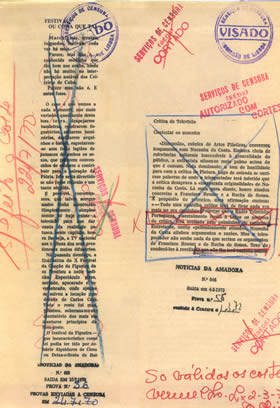
The former Soviet Union maintained a particularly extensive program of state-imposed censorship. The main organ for official censorship in the Soviet Union was the Chief Agency for Protection of Military and State Secrets generally known as the Glavlit, its Russian acronym. The Glavlit handled censorship matters arising from domestic writings of just about any kind – even beer and vodka labels. Glavlit censorship personnel were present in every large Soviet publishing house or newspaper; the agency employed some 70,000 censors to review information before it was disseminated by publishing houses, editorial offices, and broadcasting studios. No mass medium escaped Glavlit's control. All press agencies and radio and television stations had Glavlit representatives on their editorial staffs.[59]
Sometimes, public knowledge of the existence of a specific document is subtly suppressed, a situation resembling censorship. The authorities taking such action will justify it by declaring the work to be "subversive" or "inconvenient". An example is Michel Foucault's 1978 text Sexual Morality and the Law (later republished as The Danger of Child Sexuality), originally published as La loi de la pudeur [literally, "the law of decency"]. This work defends the decriminalization of statutory rape and the abolition of age of consent laws.[بحاجة لمصدر]
When a publisher comes under pressure to suppress a book, but has already entered into a contract with the author, they will sometimes effectively censor the book by deliberately ordering a small print run and making minimal, if any, attempts to publicize it. This practice became known in the early 2000s as privishing (private publishing).[60] an OpenNet Initiative (ONI) classifications:[61]
حسب البلد
Censorship for individual countries is measured by Freedom House (FH) Freedom of the Press report,[62] Reporters Without Borders (RWB) Press freedom index[63] and V-Dem government censorship effort index. Censorship aspects are measured by Freedom on the Net[32] and OpenNet Initiative (ONI) classifications.[61] Censorship by country collects information on censorship, internet censorship, press freedom, freedom of speech, and human rights by country and presents it in a sortable table, together with links to articles with more information. In addition to countries, the table includes information on former countries, disputed countries, political sub-units within countries, and regional organizations.
أستراليا
كندا
Very little is formally censored in Canada, aside from "obscenity" (as defined in the landmark criminal case of R v Butler) which is generally limited to pornography and child pornography depicting and/or advocating non-consensual sex, sexual violence, degradation, or dehumanization, in particular that which causes harm (as in R v Labaye). Most films are simply subject to classification by the British Columbia Film Classification Office under the non-profit Crown corporation by the name of Consumer Protection BC, whose classifications are officially used by the provinces of British Columbia, Saskatchewan, Ontario, and Manitoba.[64]
كوبا
Cuban media used to be operated under the supervision of the Communist Party's Department of Revolutionary Orientation, which "develops and coordinates propaganda strategies".[65] Connection to the Internet is restricted and censored.[66]
الصين
The People's Republic of China employs sophisticated censorship mechanisms, referred to as the Golden Shield Project, to monitor the internet. Popular search engines such as Baidu also remove politically sensitive search results.[67][68][69]
الكتلة الشرقية
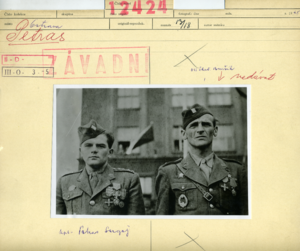
Strict censorship existed in the Eastern Bloc.[70] Throughout the bloc, the various ministries of culture held a tight rein on their writers.[71] Cultural products there reflected the propaganda needs of the state.[71] Party-approved censors exercised strict control in the early years.[72] In the Stalinist period, even the weather forecasts were changed if they suggested that the sun might not shine on May Day.[72] Under Nicolae Ceauşescu in Romania, weather reports were doctored so that the temperatures were not seen to rise above or fall below the levels which dictated that work must stop.[72]
Possession and use of copying machines was tightly controlled in order to hinder the production and distribution of samizdat, illegal self-published books and magazines. Possession of even a single samizdat manuscript such as a book by Andrei Sinyavsky was a serious crime which might involve a visit from the KGB. Another outlet for works which did not find favor with the authorities was publishing abroad.
فرنسا
Amid declining car sales in 2020, France banned a television ad by a Dutch bike company, saying the ad "unfairly discredited the automobile industry".[73]
الهند
The Constitution of India guarantees freedom of expression, but places certain restrictions on content, with a view towards maintaining communal and religious harmony, given the history of communal tension in the nation.[74] According to the Information Technology Rules 2011, objectionable content includes anything that "threatens the unity, integrity, defence, security or sovereignty of India, friendly relations with foreign states or public order".[75] Notably many pornographic websites are blocked in India.
إيران
العراق
Iraq under Baathist Saddam Hussein had much the same techniques of press censorship as did Romania under Nicolae Ceauşescu but with greater potential violence.[76]
Japan
During the GHQ occupation of Japan after WW2, any criticism of the Allies' pre-war policies, the SCAP, the Far East Military Tribunal, the inquiries against the United States and every direct and indirect references to the role played by the Allied High Command in drafting Japan's new constitution or to censorship of publications, movies, newspapers and magazines was subject to massive censorship, purges, media blackout.[77]
In the four years (September 1945–November 1949) since the CCD was active, 200 million pieces of mail and 136 million telegrams were opened, and telephones were tapped 800,000 times. Since no criticism of the occupying forces for crimes such as the dropping of the atomic bomb, rape and robbery by US soldiers was allowed, a strict check was carried out. Those who got caught were put on a blacklist called the watchlist, and the persons and the organizations to which they belonged were investigated in detail, which made it easier to dismiss or arrest the "disturbing molecule".[78]
ماليزيا
Under subsection 48(3) and (4) of the Penang Islamic Religious Administration Enactment 2004, non-Muslims in Malaysia are penalized for using the following words, or to write or publish them, in any form, version or translation in any language or for use in any publicity material in any medium: "Allah", "Firman Allah", "Ulama", "Hadith", "Ibadah", "Kaabah", "Qadhi'", "Illahi", "Wahyu", "Mubaligh", "Syariah", "Qiblat", "Haji", "Mufti", "Rasul", "Iman", "Dakwah", "Wali", "Fatwa", "Imam", "Nabi", "Sheikh", "Khutbah", "Tabligh", "Akhirat", "Azan", "Al Quran", "As Sunnah", "Auliya'", "Karamah", "False Moon God", "Syahadah", "Baitullah", "Musolla", "Zakat Fitrah", "Hajjah", "Taqwa" and "Soleh".[79][80][81]
كوريا الشمالية
روسيا
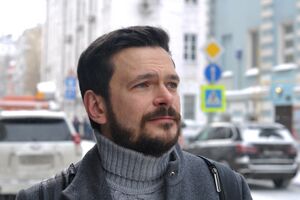
On 4 March 2022, Russian President Vladimir Putin signed into law a bill introducing prison sentences of up to 15 years for those who publish "knowingly false information" about the Russian military and its operations, leading to some media outlets in Russia to stop reporting on Ukraine or shutting their media outlet.[82][83] Although the 1993 Russian Constitution has an article expressly prohibiting censorship,[84] the Russian censorship apparatus Roskomnadzor ordered the country's media to only use information from Russian state sources or face fines and blocks.[85] As of December 2022, more than 4,000 people were prosecuted under "fake news" laws in connection with the war in Ukraine.[86]
Novaya Gazeta's editor-in-chief Dmitry Muratov was awarded the 2021 Nobel Peace Prize for his "efforts to safeguard freedom of expression". In March 2022, Novaya Gazeta suspended its print activities after receiving a second warning from Roskomnadzor.[87]
صربيا
According to Christian Mihr, executive director of Reporters Without Borders, "censorship in Serbia is neither direct nor transparent, but is easy to prove."[88] According to Mihr there are numerous examples of censorship and self-censorship in Serbia [89] According to Mihr, Serbian prime minister Aleksandar Vučić has proved "very sensitive to criticism, even on critical questions," as was the case with Natalija Miletic, a correspondent for Deutsche Welle Radio, who questioned him in Berlin about the media situation in Serbia and about allegations that some ministers in the Serbian government had plagiarized their diplomas, and who later received threats and offensive articles on the Serbian press.[89]
Multiple news outlets have accused Vučić of anti-democratic strongman tendencies.[90][91][92][93][94] In July 2014, journalists associations were concerned about the freedom of the media in Serbia, in which Vučić came under criticism.[95][96]
In September 2015 five members of United States Congress (Edie Bernice Johnson, Carlos Curbelo, Scott Perry, Adam Kinzinger, and Zoe Lofgren) have informed Vice President of the United States Joseph Biden that Aleksandar's brother, Andrej Vučić, is leading a group responsible for deteriorating media freedom in Serbia.[97]
سنغافورة
In the Republic of Singapore, Section 33 of the Films Act originally banned the making, distribution and exhibition of "party political films", at the pain of a fine not exceeding $100,000 or imprisonment for a term not exceeding two years.[98] The Act further defines a "party political film" as any film or video
- (a) which is an advertisement made by or on behalf of any political party in Singapore or any body whose objects relate wholly or mainly to politics in Singapore, or any branch of such party or body; or
- (b) which is made by any person and directed towards any political end in Singapore
In 2001, the short documentary called A Vision of Persistence on opposition politician J. B. Jeyaretnam was also banned for being a "party political film". The makers of the documentary, all lecturers at the Ngee Ann Polytechnic, later submitted written apologies and withdrew the documentary from being screened at the 2001 Singapore International Film Festival in April, having been told they could be charged in court.[99] Another short documentary called Singapore Rebel by Martyn See, which documented Singapore Democratic Party leader Dr Chee Soon Juan's acts of civil disobedience, was banned from the 2005 Singapore International Film Festival on the same grounds and See is being investigated for possible violations of the Films Act.[100]
This law, however, is often disregarded when such political films are made supporting the ruling People's Action Party (PAP). Channel NewsAsia's five-part documentary series on Singapore's PAP ministers in 2005, for example, was not considered a party political film.[101]
Exceptions are also made when political films are made concerning political parties of other nations. Films such as Michael Moore's 2004 documentary Fahrenheit 911 are thus allowed to screen regardless of the law.[102]
Since March 2009, the Films Act has been amended to allow party political films as long as they were deemed factual and objective by a consultative committee. Some months later, this committee lifted the ban on Singapore Rebel.[103]
الاتحاد السوڤيتي
Independent journalism did not exist in the Soviet Union until Mikhail Gorbachev became its leader. Gorbachev adopted glasnost (openness), political reform aimed at reducing censorship; before glasnost all reporting was directed by the Communist Party or related organizations. Pravda, the predominant newspaper in the Soviet Union, had a monopoly. Foreign newspapers were available only if they were published by communist parties sympathetic to the Soviet Union.
إسپانيا
تركيا

Online access to all language versions of Wikipedia was blocked in Turkey on 29 April 2017 by Erdoğan's government.[104]
Article 299 of the Turkish Penal Code deems it illegal to "Insult the President of Turkey". A person who is sentenced for a violation of this article can be sentenced to a prison term between one and four years and if the violation was made in public the verdict can be elevated by a sixth.[105] Prosecutions often target critics of the government, independent journalists, and political cartoonists.[106] Between 2014 and 2019, 128,872 investigations were launched for this offense and prosecutors opened 27,717 criminal cases.[107]
United Kingdom
From December 1956 until 1974 the Irish republican political party Sinn Féin was banned from participating in elections by the Northern Ireland Government.[108] From 1988 until 1994 the British government prevented the UK media from broadcasting the voices (but not words) of Sinn Féin and ten Irish republican and Ulster loyalist groups.[109]
الولايات المتحدة
In the United States, most forms of censorship are self-imposed rather than enforced by the government. The government does not routinely censor material, although state and local governments often restrict what is provided in libraries and public schools.[110] In addition, distribution, receipt, and transmission (but not mere private possession) of obscene material may be prohibited by law. Furthermore, under FCC v. Pacifica Foundation, the FCC has the power to prohibit the transmission of indecent material over broadcast. Additionally, critics of campaign finance reform in the United States say this reform imposes widespread restrictions on political speech.[111][112]
أوروگواي
In 1973, a military coup took power in Uruguay, and the State practiced censorship. For example, writer Eduardo Galeano was imprisoned and later was forced to flee. His book Open Veins of Latin America was banned by the right-wing military government, not only in Uruguay, but also in Chile and Argentina.[113]
الرقابة حسب البلد
 مقالة مفصلة: رقابة حسب البلد
مقالة مفصلة: رقابة حسب البلد
انظر أيضاً
هامش
- ^ "David's Fig Leaf". Victoria and Albert Museum. Archived from the original on 3 June 2007. Retrieved 29 May 2007.
- ^ Sui-Lee Wee; Ben Blanchard (June 4, 2012). "China blocks Tiananmen talk on crackdown anniversary". Reuters. Archived from the original on 2015-09-24. Retrieved 2013-05-08.
- ^ M.F. Burnyeat (1997), The Impiety of Socrates Mathesis publications; Ancient Philosophy 17 Accessed November 23, 2017
- ^ Debra Nails, A Companion to Greek and Roman Political Thought Chapter 21 – The Trial and Death of Socrates John Wiley & Sons, 2012 ISBN 1118556682 Accessed November 23, 2017
- ^ Plato. Apology, 24–27.
- ^ Warren, J (2001). "Socratic suicide". J Hell Stud. 121: 91–106. doi:10.2307/631830. JSTOR 631830. PMID 19681231. S2CID 24221544.
- ^ Linder, Doug (2002). "The Trial of Socrates". University of Missouri–Kansas City School of Law. Retrieved September 12, 2013.
- ^ "Socrates (Greek philosopher)". Encyclopædia Britannica. Retrieved September 12, 2013.
- ^ "The Long History of Censorship", Mette Newth, Beacon for Freedom of Expression (Norway), 2010
- ^ Landier, Michael (4 June 1997). "Internet Censorship is Absurd and Unconstitutional". Archived from the original on 2019-06-29.
- ^ "The Trial of 'Lady Chatterley's Lover'", Paul Gallagher, Dangerous Minds, 10 November 2010.
- ^ "Child Pornography: Model Legislation & Global Review" (PDF) (5 ed.). International Centre for Missing & Exploited Children. 2008. Archived from the original (PDF) on 2012-11-20. Retrieved 2012-08-25.
- ^ "World Congress against CSEC". Csecworldcongress.org. 2002-07-27. Archived from the original on March 16, 2012. Retrieved 2011-10-21.
- ^ Timothy Jay (2000). Why We Curse: A Neuro-psycho-social Theory of Speech. John Benjamins Publishing Company. pp. 208–209. ISBN 978-1556197581.
- ^ David Goldberg; Stefaan G. Verhulst; Tony Prosser (1998). Regulating the Changing Media: A Comparative Study. Oxford University Press. p. 207. ISBN 978-0198267812.
- ^ McCullagh, Declan (2003-06-30). "Microsoft's new push in Washington". CNET. Retrieved 2011-10-21.
- ^ Fitzpatrick, Laura (2010-04-27). "Top 10 Controversial Cartoons - TIME". Time (in الإنجليزية الأمريكية). ISSN 0040-781X. Retrieved 2023-10-20.
- ^ Shaw, Gareth; Zhang, Xiaoling (July 2018). "Cyberspace and gay rights in a digital China: Queer documentary filmmaking under state censorship". China Information (in الإنجليزية). 32 (2): 270–292. doi:10.1177/0920203X17734134. ISSN 0920-203X. S2CID 148751332.
- ^ "What is Music Censorship?". Freemuse.org. 1 January 2001. Archived from the original on 6 November 2008. Retrieved 2008-10-25.
- ^ Jenna Johnson (2007-07-22). "Google's View of D.C. Melds New and Sharp, Old and Fuzzy". News. Washington Post. Retrieved 2007-07-22.
- ^ Freedberg, David (2016). "The Fear of Art: How Censorship Becomes Iconoclasm". Social Research. 83: 67–99. doi:10.1353/sor.2016.0019. S2CID 147789598 – via eHOST.
- ^ Lusher, Adam (13 October 2015). "Paedophile artist's photographs and paintings 'must be destroyed'". The Independent. Retrieved 7 February 2021.
- ^ "Graham Ovenden | Tate". 2015-10-16. Archived from the original on October 16, 2015. Retrieved 2015-10-16.
- ^ Ashley, John; Jayousi, Nedal (December 2013). 'Discourse, Culture, and Education in the Israeli-Palestinian Conflict'. Friedrich-Ebert-Stiftung, Israel Office. p. 55. "In 1980, Israel banned art exhibitions and paintings of "political significance", with the grouping of the four colours of the Palestinian flag in any one painting also forbidden."
- ^ Kifner, John (October 16, 1993). "Ramallah Journal; A Palestinian Version of the Judgment of Solomon". The New York Times. Retrieved May 21, 2010.
- ^ Dalrymple, William (October 2, 2002). "A culture under fire". The Guardian. London. Retrieved May 21, 2010.
- ^ "The watermelon makes a colourful interlude". The Age. Melbourne. September 12, 2004.
- ^ Thompson, Erin (27 November 2017). "Opinion: Art Censorship at Guantánamo Bay". The New York Times. Retrieved 7 February 2021.
- ^ Chatterjee, Deen K. (2011), "Guantanamo Bay Prisoners", Encyclopedia of Global Justice, Springer Netherlands, p. 467, doi:, ISBN 978-1402091599
- ^ "Censorship Reports". Nigeria: Abacha's Media Crackdown. doi:10.1163/2210-7975_hrd-2210-0161.
- ^ "Introduction: The Site of the Social", Site Reading, Princeton University Press, 2016-01-31, pp. 1–24, doi:, ISBN 978-1400873807
- ^ أ ب "Freedom on the Net 2018" (PDF). Freedom House. November 2018. Archived from the original (PDF) on 1 November 2018. Retrieved 1 November 2018.
- ^ OpenNet Initiative "Summarized global Internet filtering data spreadsheet", 8 November 2011 and "Country Profiles", the OpenNet Initiative is a collaborative partnership of the Citizen Lab at the Munk School of Global Affairs, University of Toronto; the Berkman Center for Internet & Society at Harvard University; and the SecDev Group, Ottawa
- ^ "Internet Enemies", Enemies of the Internet 2014: Entities at the heart of censorship and surveillance, Reporters Without Borders (Paris), 11 March 2014. Retrieved 24 June 2014.
- ^ Internet Enemies, Reporters Without Borders (Paris), 12 March 2012 Archived مارس 23, 2012 at the Wayback Machine
- ^ Due to legal concerns the OpenNet Initiative does not check for filtering of child pornography and because their classifications focus on technical filtering, they do not include other types of censorship.
- ^ أ ب ت Freedom of Connection, Freedom of Expression: The Changing Legal and Regulatory Ecology Shaping the Internet, Dutton, William H.; Dopatka, Anna; Law, Ginette; Nash, Victoria, Division for Freedom of Expression, Democracy and Peace, United Nations Educational, Scientific and Cultural Organization (UNESCO), Paris, 2011, 103 pp., ISBN 978-9231041884
- ^ "Bylaws for Internet Corporation for Assigned Names and Numbers | A California Nonprofit Public-Benefit Corporation". www.icann.org. Retrieved 2020-04-28.
- ^ "ICANN". www.icann.org. Retrieved 2020-04-28.
- ^ Wakefield, Jane (2010-12-07). "Wikileaks' struggle to stay online". BBC News (in الإنجليزية البريطانية). Retrieved 2020-04-28.
- ^ "Operation In Our Sites". www.ice.gov (in الإنجليزية). 22 May 2014. Retrieved 2020-04-28.
- ^ Internet Architecture Board (2000). "IAB Technical Comment on the Unique DNS Root". tools.ietf.org (in الإنجليزية). doi:10.17487/RFC2826. Retrieved 2020-04-28.
- ^ "First Nation in Cyberspace" Archived 2017-01-13 at the Wayback Machine, Philip Elmer-Dewitt, Time, 6 December 1993, No. 49
- ^ "Cerf sees government control of Internet failing", Pedro Fonseca, Reuters, 14 November 2007
- ^ 2007 Circumvention Landscape Report: Methods, Uses, and Tools, Hal Roberts, Ethan Zuckerman, and John Palfrey, Beckman Center for Internet & Society at Harvard University, March 2009
- ^ For the BBC poll Internet users are those who used the Internet within the previous six months.
- ^ "BBC Internet Poll: Detailed Findings", BBC World Service, 8 March 2010
- ^ "Internet access is 'a fundamental right'", BBC News, 8 March 2010
- ^ Madrigal, Alexis C. (24 January 2011). "The Inside Story of How Facebook Responded to Tunisian Hacks". The Atlantic (in الإنجليزية الأمريكية). Retrieved 2016-04-15.
- ^ King, Gary; Pan, Jennifer (2014). "Reverse-engineering censorship in China: Randomized experimentation and participant observation". Science. 345 (6199): 1251722. doi:10.1126/science.1251722. PMID 25146296. S2CID 5398090.
- ^ "Professor Gary King, Inaugural Government Regius Lecture 2015". Vimeo. 2016-01-14. Retrieved 2016-04-12.
- ^ Shao, Li (1 November 2018). "The Dilemma of Criticism: Disentangling the Determinants of Media Censorship in China". Journal of East Asian Studies. 18 (3): 279–297. doi:10.1017/jea.2018.19. S2CID 158396167.
- ^ Ryan, Fergus; Fritz, Audrey; Impiombato, Daria (2020). "TikTok censorship". Tiktok and Wechat: 04–24.
- ^ Byrd P. "It's all fun and games until somebody gets hurt: the effectiveness of proposed video game regulation." Archived 2015-09-24 at the Wayback Machine Houston Law Review 2007. Accessed 19 March 2007.
- ^ "A Hornet's Nest Over Violent Video Games", James D. Ivory and Malte Elson, The Chronicle of Higher Education (Washington), 16 October 2013.
- ^ gamesradararchive (19 October 2012). "No More Heroes – Censored gameplay 12-07-07" – via YouTube.
- ^ "Censorship is inseparable from surveillance", Cory Doctorow, The Guardian, 2 March 2012
- ^ "Online Censorship : Ubiquitous Big Brother, witchhunt for dissidents"[dead link], WeFightCensorship.org, Reporters Without Borders, retrieved 12 March 2013
- ^ Koltsova, Olessia (2006-09-27). News Media and Power in Russia. doi:10.4324/9780203536971. ISBN 978-0203536971.
- ^ Winkler, David (11 July 2002). "Journalists Thrown 'Into the Buzzsaw'". CommonDreams.org. Archived from the original on August 4, 2007.
- ^ أ ب OpenNet Initiative "Summarized global Internet filtering data spreadsheet", 29 October 2012 and "Country Profiles", the OpenNet Initiative is a collaborative partnership of the Citizen Lab at the Munk School of Global Affairs, University of Toronto; the Berkman Center for Internet & Society at Harvard University; and the SecDev Group, Ottawa
- ^ "2012 Freedom of the Press Data", Freedom House, 1 May 2012
- ^ "Press Freedom Index 2013" Archived 2013-02-15 at the Wayback Machine, Reporters Without Borders, 30 January 2013
- ^ "Our authority & governance". consumerprotectionbc.ca. Retrieved 29 August 2021.
- ^ "10 most censored countries". The Committee to Protect Journalists.
- ^ "Going online in Cuba: Internet under surveillance" (PDF). Reporters Without Borders. 2006. Archived from the original (PDF) on 2009-03-03.
- ^ "Baidu's Internal Monitoring and Censorship Document Leaked (1)". China Digital Times (CDT). May 2009.
- ^ "Baidu's Internal Monitoring and Censorship Document Leaked (2)". China Digital Times (CDT). 30 April 2009.
- ^ "Baidu's Internal Monitoring and Censorship Document Leaked (3)". China Digital Times (CDT). 29 April 2009.
- ^ Major & Mitter 2004, p. 6
- ^ أ ب Major & Mitter 2004, p. 15
- ^ أ ب ت Crampton 1997, p. 247
- ^ Boffey, Daniel (1 July 2020). "France bans Dutch bike TV ad for creating 'climate of fear' about cars". The Guardian. Archived from the original on 16 December 2020.
- ^ "The Constitution of India Archived 24 نوفمبر 2010 at the Wayback Machine" 658.79 KiB, India Code. Retrieved 3 June 2006.
- ^ "Uncle dictates, cyber boys dispose – Sibal to work on norms for social sites". The Telegraph. Calcutta, India. 7 December 2011. Archived from the original on 22 March 2016. Retrieved 2 June 2020.
- ^ Svolik, Milan W. (2012), The World of Authoritarian Politics, Cambridge University Press, pp. 19–50, doi:, ISBN 978-1139176040
- ^ "Ghqによる検閲の時代".
- ^ "「検閲官 発見されたGhq名簿」 著・山本武利". 15 April 2021.
- ^ "Check law first, Karpal asks Penang government over decree banning 'Islamic words'". Malaysia Insider. Archived from the original on 2014-01-15.
- ^ "Penang mufti outlaws 40 words to non-Muslims". New Straits Times. 2014. Archived from the original on 2014-01-11.
- ^ "Enactment". Jabatan Mufti Negeri. 2012. Archived from the original on April 21, 2014. Retrieved 2014-09-14.
- ^ "Over 150 Journalists Flee Russia Amid Wartime Crackdown On Free Press – Reports". Moscow Times. 3 April 2022. Archived from the original on 8 March 2022.
Dozhd, Ekho Moskvy and Znak have closed down after being blocked by the authorities
- ^ "Putin Signs Law Introducing Jail Terms for 'Fake News' on Army". Moscow Times. 4 March 2022. Archived from the original on 14 March 2022.
- ^ "Explained: What Russia's war on Ukraine has meant for its news media". The Indian Express. 18 March 2022. Archived from the original on 29 March 2022.
- ^ "Use Only Official Sources About Ukraine War, Russian Media Watchdog Tells Journalists". Moscow Times. 24 February 2022. Archived from the original on 24 February 2022.
- ^ Weir, Fred (5 December 2022). "In Russia, critiquing the Ukraine war could land you in prison". CSMonitor.com.
- ^ "Russia's Novaya Gazeta newspaper pauses activities after official warning". Reuters. 28 March 2022.
- ^ Censorship in Serbia is easy to prove – RWB, B92, 19/02/2015. Retrieved 12/10/2016
- ^ أ ب B92, 19/02/2015. Retrieved 12/10/2016
- ^ Filipovic, Gordana (March 27, 2017). "How a Premier May Become a Strongman in Serbia: QuickTake Q&A". Bloomberg. Retrieved 2018-09-18.
- ^ Nougayrède, Natalie (2018-04-11). "Beware the chameleon strongmen of Europe". The Guardian (in الإنجليزية). Retrieved 2018-09-18.
- ^ Karnitschnig, Matthew (2016-04-14). "Serbia's latest would-be savior is a modernizer, a strongman – or both". Politico Europe (in الإنجليزية الأمريكية). Retrieved 2018-09-18.
- ^ Janjevic, Darko (June 18, 2017). "EU and the Balkans: Brussels' favorite strongmen". DW (in الإنجليزية الأمريكية). Retrieved 2018-09-18.
- ^ Anastasijevic, Dejan (April 4, 2017). "Serbia's Vucic stronger than ever". EU Observer (in الإنجليزية). Retrieved 2018-09-18.
- ^ Die Tageszeitung: Die Pampigkeit des Herrn Vučić – In Serbien werden Internetseiten attackiert, Blogs gesperrt und Blogger festgenommen. Die Betroffenen berichteten wohl zu kritisch über die Regierung (German) – The stroppiness of Mr. Vučić – In Serbia being attacked websites, blocked blogs and arrested bloggers. The victims reported probably too critical about the government
- ^ Die Tageszeitung: "Serbische Regierung zensiert Medien – Ein Virus namens Zensur", taz.de; accessed 9 December 2015.(in ألمانية)
- ^ Čogradin, Snežana (4 November 2016). "What is Andrej Vučić occupation?". Danas.
- ^ "Films Act – Singapore Statutes Online". sso.agc.gov.sg (in الإنجليزية). Retrieved 2020-11-24.
- ^ "Heard about the film Singapore has banned its people from seeing?". The Independent (in الإنجليزية). 2014-09-16. Retrieved 2020-11-24.
- ^ "Police investigation of filmmaker intensifies; SEAPA urges authorities to end probe and repeal Films Act". IFEX (in الإنجليزية الأمريكية). 2005-09-26. Retrieved 2020-11-24.
- ^ Tan, Kenneth Paul (2016-04-02). "Choosing What to Remember in Neoliberal Singapore: The Singapore Story, State Censorship and State-Sponsored Nostalgia". Asian Studies Review. 40 (2): 231–249. doi:10.1080/10357823.2016.1158779. ISSN 1035-7823. S2CID 147095200.
- ^ "Competing narratives is a boon, not a bane". sg.news.yahoo.com (in الإنجليزية). 4 October 2014. Retrieved 2020-11-24.
- ^ "Singapore eases law on political films". Reuters (in الإنجليزية). 2009-03-23. Retrieved 2020-11-24.
- ^ "Turkish authorities block Wikipedia without giving reason". BBC News (in الإنجليزية البريطانية). 29 April 2017.
- ^ Tecimer, Cem (2018-07-20). "The Curious Case of Article 299 of the Turkish Penal Code: Insulting the Turkish President". Verfassungsblog: On Matters Constitutional (in الإنجليزية الأمريكية). doi:10.17176/20180720-091632-0. Archived from the original on 2020-11-17.
- ^ Eko, Lyombe (2019). "The Charlie Hebdo Affair in Turkey: Balancing Human Rights and Religious Rites". The Charlie Hebdo Affair and Comparative Journalistic Cultures: Human Rights Versus Religious Rites (in الإنجليزية). Springer International Publishing. p. 208. ISBN 978-3-030-18079-9.
- ^ "Investigation Highlights Spike in Cases of Insulting Turkish President". Balkan Insight. 15 January 2021. Archived from the original on 2 February 2021.
- ^ Bourne, Angela (2018). Democratic Dilemmas: Why democracies ban political parties. Taylor & Francis Group. p. 176. ISBN 9781138898011.
- ^ Welch, Francis (5 April 2005). "The 'broadcast ban' on Sinn Féin". BBC News. Archived from the original on 26 July 2013. Retrieved 21 June 2013.
- ^ "Books". National Coalition Against Censorship (in الإنجليزية الأمريكية). Retrieved 2016-04-11.
- ^ "The Trick of Campaign Finance Reform". Christian Science Monitor.
- ^ "Felonious Advocacy". reason. April 2009.
- ^ "Fresh Off Worldwide Attention for Joining Obama's Book Collection, Uruguayan Author Eduardo Galeano Returns with "Mirrors: Stories of Almost Everyone"". Democracynow.org. 28 May 2009. Retrieved 2011-10-21.
مصادر
معلومات عامة
- Abbott, Randy. "A Critical Analysis of the Library-Related Literature Concerning Censorship in Public Libraries and Public School Libraries in the United States During the 1980s." Project for degree of Education Specialist, University of South Florida, December 1987. ED 308 864
- Burress, Lee. Battle of the Books. Metuchen, NJ: The Scarecrow Press, 1989. ED 308 508
- Butler, Judith, "Excitable Speech: A Politics of the Performative" (1997)
- Foucault, Michel, edited by Lawrence D. Kritzman. Philosophy, Culture: interviews and other writings 1977–1984 (New York/London: 1988, Routledge, ISBN 0-415-90082-4) (The text Sexual Morality and the Law is Chapter 16 of the book).
- O'Reilly, Robert C. and Larry Parker. "Censorship or Curriculum Modification?" Paper presented at a School Boards Association, 1982, 14 p. ED 226 432
- Hansen, Terry. The Missing Times: News media complicity in the UFO cover-up, 2000. ISBN 0-7388-3612-5
- Hendrikson, Leslie. "Library Censorship: ERIC Digest No. 23." ERIC Clearinghouse for Social Studies/Social Science Education, Boulder, Colorado, November 1985. ED 264 165
- Hoffman, Frank. "Intellectual Freedom and Censorship." Metuchen, NJ: The Scarecrow Press, 1989. ED 307 652
- Marek, Kate. "Schoolbook Censorship USA." June 1987. ED 300 018
- National Coalition against Censorship (NCAC). "Books on Trial: A Survey of Recent Cases." January 1985. ED 258 597
- Ringmar, Erik A Blogger's Manifesto: Free Speech and Censorship in the Age of the Internet (London: Anthem Press, 2007)
- Small, Robert C., Jr. "Preparing the New English Teacher to Deal with Censorship, or Will I Have to Face it Alone?" Annual Meeting of the National Council of Teachers of English, 1987, 16 p.
- (Arguing that an English teacher should get advice from school librarians in preparing to encounter three levels of censorship:
- Rejection of adolescent fiction and popular teen magazines as having low value,
- Experienced colleagues discouraging "difficult" lesson plans,
- Outside interest groups limiting students' exposure. ED 289 172)
- Terry, John David II. "Censorship: Post Pico." In "School Law Update, 1986," edited by Thomas N. Jones and Darel P. Semler. ED 272 994
- Supreme Court rejects advocates' plea to preserve useful formats
- World Book Encyclopedia, volume 3 (C-Ch), pages 345, 346
- CS1 الإنجليزية الأمريكية-language sources (en-us)
- CS1 الإنجليزية البريطانية-language sources (en-gb)
- Articles with dead external links from March 2015
- Articles with ألمانية-language sources (de)
- Short description is different from Wikidata
- Articles with hatnote templates targeting a nonexistent page
- Articles with unsourced statements from March 2013
- Pages using reflist with unknown parameters
- Censorship
- Censorship in the arts
- Historical deletion
- Freedom of expression

